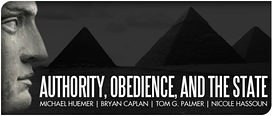Let me trace the strand of conversation back to the beginning: In my first post, I worried that Huemer assumes, but does not justify, a controversial conception of property rights. He says Sam’s neighbors don’t have to give up what they own to help the poor. But if people have rights (e.g.) against poverty, property rights may be limited by these rights. Caplan said I seemed to reject negative rights. I do not. I believe people can have property rights, which are traditionally understood as negative rights, and I do not think we can murder people with impunity either.
Caplan also said I am committed to addressing problems with the distribution of property rights via individual (“personal”) action.[1] I am not. In fact, one of my main points in the original post was that there may be a special role for states to address rights violations justified in part out of a concern for individual freedom. Now Palmer says I missed Caplan’s point because Caplan is concerned with what will work to alleviate poverty. Palmer also explains what he thinks is necessary to alleviate poverty. I am not impressed with the evidence either Caplan or Palmer provide for their views about what will and will not alleviate poverty. (Although Palmer does better than Caplan in this respect – graphs showing correlations do not establish causation etc.).
That said, I hope the preceding summary of the state of the debate makes it clear that an account of the causes of poverty was not what was at issue between Huemer and me. So, although I am tempted to use this forum to talk about the causes of poverty and what I think we can do about it, I will refrain. I have followed debates about these issues in development economics pretty closely and I have written a lot about trade and aid. But I do not think that this is the forum to discuss what causes poverty or what we can do about it—there are many development economists with much more expertise who should be asked to write on the topic if Cato is seriously committed to having a rigorous academic debate about it. Let me just say that I never claimed, as Palmer implies, that lack of property at the country level is a major cause of poor individuals’ poverty. Nor do I suggest that corruption is not a problem. Rather, I think we need to look at all of the factors that might reasonably impact poverty in a much more rigorous way if we want to make progress on this issue. In my book, I discuss the kind of evidence that we should appeal to in trying to establish empirical hypotheses as well as some evidence that there are many good aid programs; see also my article “Empirical Evidence and the Case for Foreign Aid.”
Palmer does address my argument when he suggests Lockeans need not accept my claims about the limits of property rights. The point is fair enough. That said, I am not convinced that the argument he imputes to Locke works, and my claim was only that, on Nozick’s adaptation of Locke’s argument, property rights are limited in the way I suggest (and believe is imminently plausible). The passage in Locke that Palmer cites does not show that there will be enough for everyone. It may be true that property rights encourage investments that generate more for people to purchase—but not acquire for the first time—but it is hard to see how this helps the global poor who do not have the money they need to purchase even the most basic necessities. Nozick’s interpretation of the Lockean proviso is better. He gives something like the following example: Suppose you have bought a well in the desert and all the other wells dry up. Even if all the other wells dried up due to factors you could not control, you have to offer water at a price others can afford. If some cannot afford to pay anything because they have no property, wealth, or even labor to offer, you presumably have to offer them the water for free. (Incidentally, Nozick’s theory is not plausible in restricting the application of the proviso to things you have not created—he thinks pharmaceutical companies can charge exorbitant prices for essential medicines they have created. But, plausibly, on his interpretation, the proviso applies to goods that are not just acquired for the first time.) In any case it is obvious that not everyone has enough in our world when 18 million people die every year from easily preventable poverty-related illnesses.
As far as Caplan’s most recent post—nothing I said in my original response commits me to accepting the argument Caplan puts forward. That said, I do happen to think that when governments fail individuals may have to find other ways to do their part in helping the global poor – though they may not have to sacrifice everything to do that.
Note
[1] I apologize to Caplan for quoting the wrong part of his essay on this point—though I do not believe I misunderstood what he was saying and this should not affect the content of my reply.

